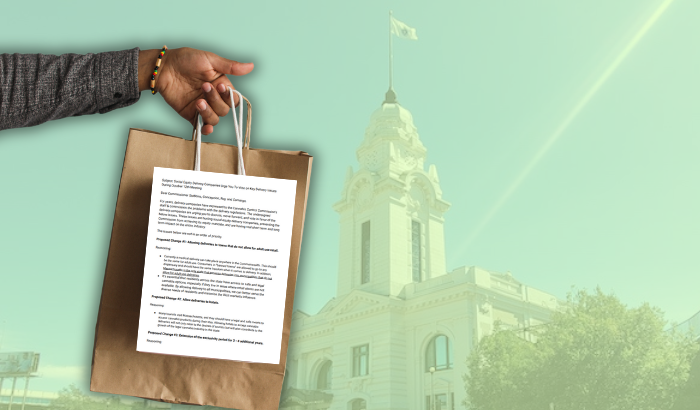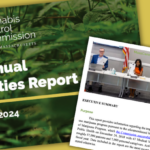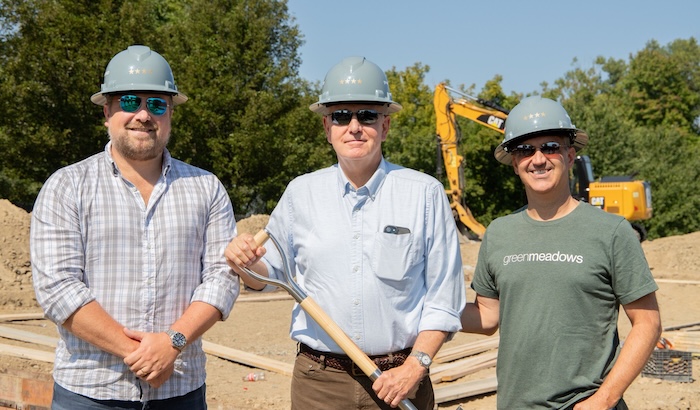
Cannabis Control Commission addresses “two-driver” rule, allowing deliveries to “no” towns, and other possible tweaks, but need more time to finalize decisions on some long-simmering issues
Amid the many matters facing the Massachusetts Cannabis Control Commission right now, from rewriting Host Community Agreement regulations to the routine licensing of businesses, one group of operators has been asking for attention and relief. Owners of delivery and courier services have called for changes that could help their companies improve their margins, but while commission members opened the door for such discussions in August, the matter was moved aside to prioritize work with a state-required deadline.
These are not new problems though. For more than a year, people with these licenses have asked for changes, including to the rule that requires cannabis delivery companies to put two employees on the road together. Operators say they are already struggling due to excessive compliance among other factors, and argue that the two-agent stipulation is especially burdensome. And after a long wait, commissioners dove into delivery head-first during their meeting on Thursday.
In her opening comments on the topic, Acting Chair Ava Callender Concepcion said the whole initial idea was to “offer a lower-capital license type as another avenue for ensuring exclusivity and participation by disproportionately harmed communities in this industry.” She noted how, under the current regulations, certified Economic Empowerment and Social Equity program participants have exclusive access to three types of delivery license models for three years: the Marijuana Courier (which picks up products from retailers and delivers to customers), Marijuana Delivery Operator (which can purchase products wholesale), and Marijuana Establishment with Delivery Endorsement, which is available for Microbusiness licensees.
The goal for Thursday, Concepcion added, was for “the commission to really understand the key issues that licensees are facing in the space, and to hear the full scope of conversations” that she and commissioner Camargo have had with “key stakeholders.”
To help steer the proceedings, nine delivery operators sent a co-signed letter to commissioners ahead of Thursday’s meeting. Their message: “For years, delivery companies have expressed to the Cannabis Control Commission’s staff and commission the problems with the delivery regulations. … These issues are hurting social equity delivery companies, preventing the Commission from achieving its equity mandate, and are having real short term and long term impact on the entire industry.”
The writers of the letter propose the following changes: “Allow deliveries to towns that do not allow for adult use retail; Allow deliveries to hotels; Extend the exclusivity period for two to four additional years; Make the two-driver rule optional; Remove or modify the dispatcher; Allow delivery operators to repackage.”
In Massachusetts, 227 municipalities currently allow delivery, while 124 do not. “A medical delivery can take place anywhere in the Commonwealth,” the operators’ letter notes. “This should be the same for adult use. Consumers in ‘banned towns’ are allowed to go to any dispensary and should have the same freedom when it comes to delivery. … By allowing delivery to all municipalities, we can better serve the diverse needs of residents and minimize the illicit market’s influence.”
On another point, both the operators in their letter as well as regulators during Thursday’s meeting noted that Mass is currently the only state where deliveries require two agents. “This is a big one,” Commissioner Camargo said. “When we think about alcohol, we know that alcohol delivery is allowed in ‘no’ towns, or dry towns. This one would allow for expansion of opportunities for delivery operators, and it would also get more people to receive safe product and tested product throughout the commonwealth and reduce the opportunity for the illicit market and illicit deliveries.”
On this one, the operators’ letter states: “The ‘Two Agents in a Vehicle’ regulation, as it stands, imposes unnecessary constraints on the cannabis delivery industry. While we understand the initial concerns about security, this regulation has proven to be overly restrictive and burdensome for licensed delivery operators. It increases operational costs, which are ultimately passed on to consumers, and hinders the growth of the legal cannabis market.”
They’re also calling for a change to the “30-minute checks that must occur at every delivery, stop, and if no delivery, every 30 minutes. The result is a public safety issue as these drivers are constantly being forced to take their attention off the road for the sake of compliance. This process also does not exist in law enforcement departments, security, alcohol delivery, or pharmaceutical delivery.”
Regarding the current three-year exclusivity period, the letter argues: “It is clear that the current delivery regulations have failed the Social Equity and Economic Empowerment applicants.There are only a handful of retailers offering delivery and the vast majority of delivery companies are struggling to stay afloat. There needs to be a reset to protect the few SE/EE owned businesses in the space.”
Commissioners also discussed a rule change that would allow delivery operators to repackage products (for example, turning flower into prerolls). As the writers of the letter explain: “Retailers have the ability to buy products in bulk, repackage, and sell these assembled products to make higher margins. … The ability for delivery companies to possess this capability is crucial, as our capacity to cater to a limited number of customers daily necessitates the optimization of profit margins to ensure our business sustainability, particularly in the face of price compression.”
Regulators appear to be potentially open to versions of all of these tweaks, though they will only likely move to finalize some decisions around delivery at their followup meeting next week (the agenda lists a “possible vote”). While Commissioner Kimberly Roy said during a press availability after Thursday’s public meeting that members may vote on changes to the current two-license cap for delivery operators and repackaging on Monday, questions around “no” towns and the number of agents who need to ride in a vehicle need more fleshing out. Among other complications, CCC members want to learn more about past safety problems involving delivery companies and third-party wholesale transporters, who also have a two-agent rule. CCC Director of Investigations Nomxolisi Khumalo said there have been about 40 incidents ranging from theft to agents crossing state lines and delivering to “no” towns since Jan. 1, 2021.
In a followup statement released after Thursday’s meeting, the delivery operators wrote (emphases theirs): “Third party transporters have been operating in the industry since its early inception and are included in this data. 3rd party transporters do not deliver to people’s homes and carry 10x – 100x more in product value compared to delivery companies. Their inclusion in the report skews the data. We are not advocating for the 2nd individual to be removed for wholesale transports. We would like to see the second driver removed for home delivery only.“
“At this point, it is obvious we will not be discussing two agents in a vehicle on Monday,” Camargo said. “We need some time, and we need some data. We have a meeting in November, or we can always call a new meeting if we have to, but I think in all fairness that we [need to] give ourselves some time, and our team some time, so we can have the right information.”
Saying that staffers only have one work day before Monday to collect all the requested research and analysis, Camargo added at the media availability after the meeting: “There are still things that we need to figure out and be sure of. … We want to make educated policy decisions.”
In their followup letter, the delivery operators emphasized the urgency of the situation: “A majority of delivery companies are financially struggling, some have paused operations, and others have laid people off and downsized.”






















